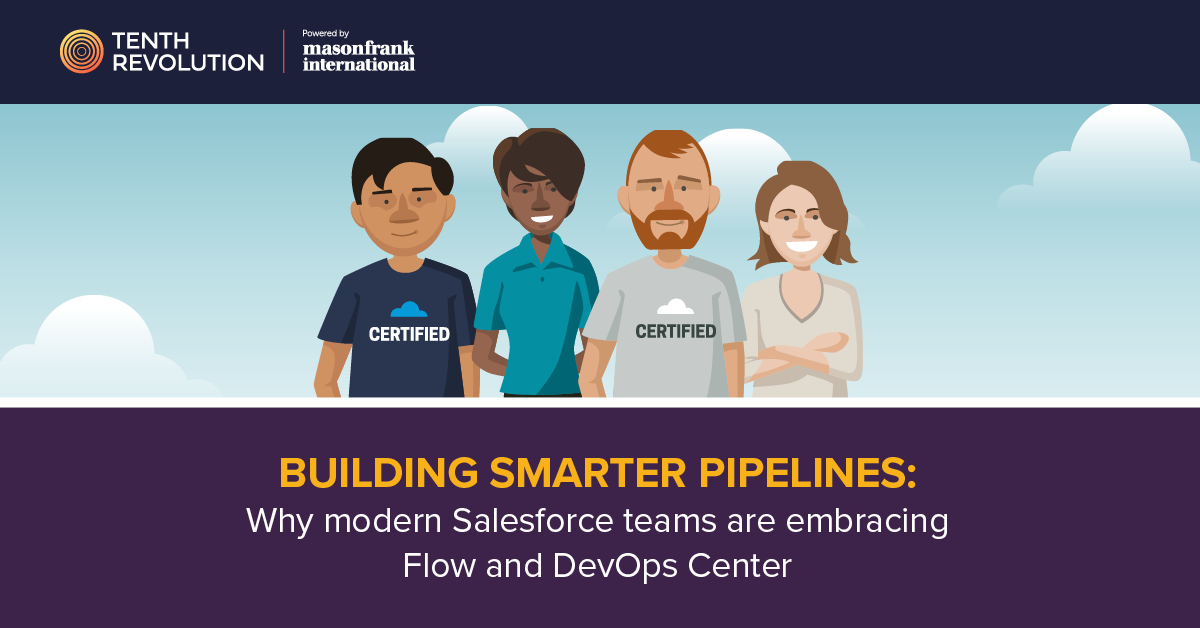
Salesforce development has reached a new level of maturity.
Where teams once managed endless manual workflows, unpredictable deployments and high-risk releases, organizations are now moving toward structured, automated systems that deliver both speed and stability. Flow and DevOps Center sit at the center of this change, helping businesses simplify development, improve governance and make Salesforce environments easier to maintain.
For executives, this shift means faster releases, reduced operational risk and greater visibility across the entire CRM ecosystem.
Flow: Scalable automation with control
Legacy automations created complexity over time. Hard-coded workflows, overlapping rules and manual triggers made updates risky and maintenance time-consuming. Flow provides a new foundation for automation that is visual, modular and easy to test.
Using Flow, teams can build reusable logic, validate outcomes before deployment and manage automation through a consistent framework. The result is a Salesforce environment that scales smoothly without adding unnecessary risk or technical debt.
The business impact is significant. Well-governed automation supports efficiency and stability, enabling teams to deliver new functionality faster and with fewer errors. Mason Frank helps organizations hire Salesforce professionals who can design Flow-first frameworks that grow with the business and maintain compliance across departments.
DevOps Center: Modernizing releases
DevOps Center transforms how Salesforce teams manage updates and deployments. Instead of relying on manual change sets or spreadsheets, version control now governs the entire release process. Every change is tracked, tested and reversible, giving organizations confidence that updates will be delivered safely and consistently.
This visibility helps leaders understand what is changing, when it is happening and how it affects core systems. For enterprises that depend on Salesforce to manage customer relationships and financial processes, this reliability is crucial for maintaining service quality and regulatory compliance.
With structured DevOps pipelines in place, teams can deliver more frequent updates while minimizing downtime and risk. Mason Frank connects hiring managers with Salesforce DevOps specialists who understand how to implement these systems, balancing innovation with stability.
Source control and modular design
Modern Salesforce delivery relies on modular development. Using second-generation packaging (2GP) and version control systems, teams can organize code and configurations into smaller, independent units. These components can then be deployed or rolled back without disrupting the wider platform.
This modular approach enables:
- Parallel development across multiple teams
- Faster updates and simplified rollbacks
- Easier testing and dependency management
For business leaders, the benefit is agility without chaos. Development teams can innovate quickly while maintaining quality control, reducing bottlenecks and ensuring that every change aligns with business priorities.
Enterprises adopting this model are seeing shorter release cycles and fewer deployment failures. The combination of Flow, DevOps Center and modular design provides a framework for continuous improvement and predictable delivery.
According to the Mason Frank Careers and Hiring Guide 2025, 77% of Salesforce professionals say automation and DevOps experience are among the most in-demand skills across enterprise teams. For hiring managers, that underscores the importance of securing talent who can deliver sustainable automation and scalable development practices.
The culture behind modern Salesforce delivery
Technology alone cannot guarantee success. Sustainable Salesforce delivery depends on culture as much as on tools. The organizations that see the greatest benefits from Flow and DevOps Center are those that combine technical structure with collaboration and shared accountability.
That means maintaining small, well-tested automations, documenting pipelines clearly and fostering cooperation between admins, developers and business users. For executives, these practices build trust across teams and create a consistent rhythm of improvement that aligns with organizational goals.
The right people make that culture possible. Mason Frank helps enterprises hire Salesforce DevOps and automation professionals who understand both the technical and organizational sides of transformation, helping leaders build teams ready for scalable delivery.
Preparing for future-ready Salesforce pipelines
The evolution of Salesforce development is not just about tools but about how teams work. DevOps Center and Flow bring automation and structure to every stage of the lifecycle, but success depends on governance, training and change management.
Executives looking to modernize their pipelines should focus on:
- Building a culture of continuous delivery
- Standardizing automation practices with Flow
- Implementing version control and CI/CD pipelines
- Hiring experienced professionals who understand both development and operations
This combination allows organizations to deliver new features faster without compromising quality or compliance. With the right strategy and the right people, Salesforce development becomes a competitive advantage rather than an operational challenge.


